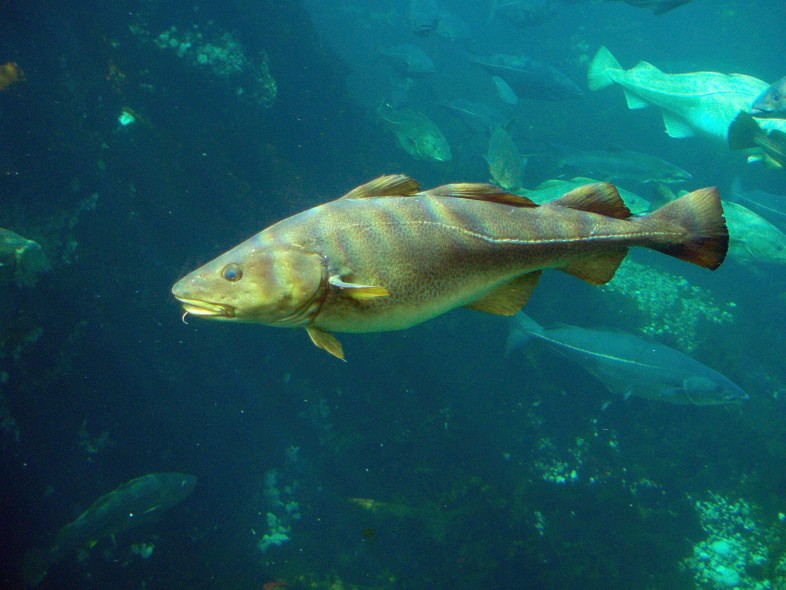Charging that New England fishery regulators are dominated by “deference to short-term economic interests,” the Conservation Law Foundation on Thursday filed a petition with the Department of Commerce seeking a halt to all directed fishing for Atlantic cod.
No fishing should be allowed until the New England Fishery Management Council and NMFS meet their legal obligation to end overfishing and rebuild the Georges Bank and Gulf of Maine cod stocks, the Boston-based environmental group says. Those steps should include 100 percent at-sea monitoring, area closures to protect spawning locations and habitat, and requiring selective groundfish gear, such as haddock separator trawls, the petition says.
The foundation wants a prohibition on directed commercial and recreational fishing using large area closures “once a stock’s incidental catch limit is caught.” The petition also calls for reducing “the incidental catch rate annually consistent with the current acceptable biological catch control rule until overfishing at sea is ended.”
“After decades of reckless decision-making, Atlantic cod populations are now in crisis,” said Shelley. “To give this iconic species a chance at survival and recovery, the federal government must take the strongest possible action today and temporarily prohibit further cod fishing.”
It’s not the first time activists have sought a widespread shutdown of cod fishing to force stronger action from managers. The Center for Biological Diversity filed a similar petition in 2015, urging NMFS to ban directed cod fishing in the Gulf of Maine. Like the Conservation Law Foundation action, the earlier petition argued the agency and New England council were failing their legal obligations under the Magnuson-Stevens Fishery Conservation and Management Act.
On Thursday, Tom Nies, executive director of the New England council, said the Conservation Law Foundation arguments oversimplify a history of the council acting in good faith on scientific advice and recommendations from its scientific and statistical committee.
One common thread to criticism of the council on cod is “they’re looking at the council’s performance based on information they have now, that we didn’t know then,” said Nies.
Council members have recognized the stocks are in bad shape and need to be rebuilt, said Nies. Despite acting on scientific information, “obviously that hasn’t happened, and it’s been extremely frustrating,” he said.
“It’s not like we’re making up these quotas,” Nies added. Based on stock assessments, the science and statistical committee establishes allowable biological catch as the basis for quotas, and “the fishing mortality rate has been dramatically reduced” since 2015, he said.
Managers have recognized that lack of sufficient information about catches and discards is likely hobbling rebuilding efforts, and the council’s latest proposals in Amendment 23 include achieving 100 percent at-sea monitoring, using onboard observers or electronic monitoring.
NMFS regional administrator Michael Pentony moved that alternative — adopted by other council members — as a way to bring the issues to public hearing. Part of that must be determining the true costs of getting the data needed to restore the stocks, he said.
Years of overfishing and cod declines have brought stricter regulations and limits to New England almost every season since the mid-1990s. As it turned out what appeared to be bright spots — like an apparent 2008 increase in Gulf of Maine cod biomass — turned out to be illusory.
“In the nearly 30 years since NMFS was first ordered by a federal court to prevent overfishing of Atlantic cod, NMFS has approved 16 amendments to the Northeast Multispecies Fishery Management Plan and 53 framework adjustments, none of which has actually prevented overfishing,” the foundation’s petition states. “In the 14 years since Congress directed NMFS to immediately end overfishing of overfished stocks, such as Atlantic cod, in order to rebuild all overfished fisheries, NMFS has not ended overfishing in the cod fishery.”
At times, the Conservation Law Foundation itself defended managers during years when they appeared to be making progress. During a March 2011 federal court hearing on Amendment 16 to the groundfish plan, Shelley argued against a lawsuit challenging the new measure.
“This lawsuit is not so much about the specific merits of Amendment 16, but more about the integrity of the process by which the new rules were developed and vetted and set into motion,” Shelley told District Court Judge Rya W. Zobel.
“CLF supports the council’s approval of Amendment 16 not because it is perfect, but because it represents a reasonable decision, reached after an extended transparent public debate that reasonably meets the Magnuson Stevens Act and National Environmental Policy Act requirements while attempting to provide additional flexibility for fishermen in the region to fish more efficiently and profitably if they want to.”







